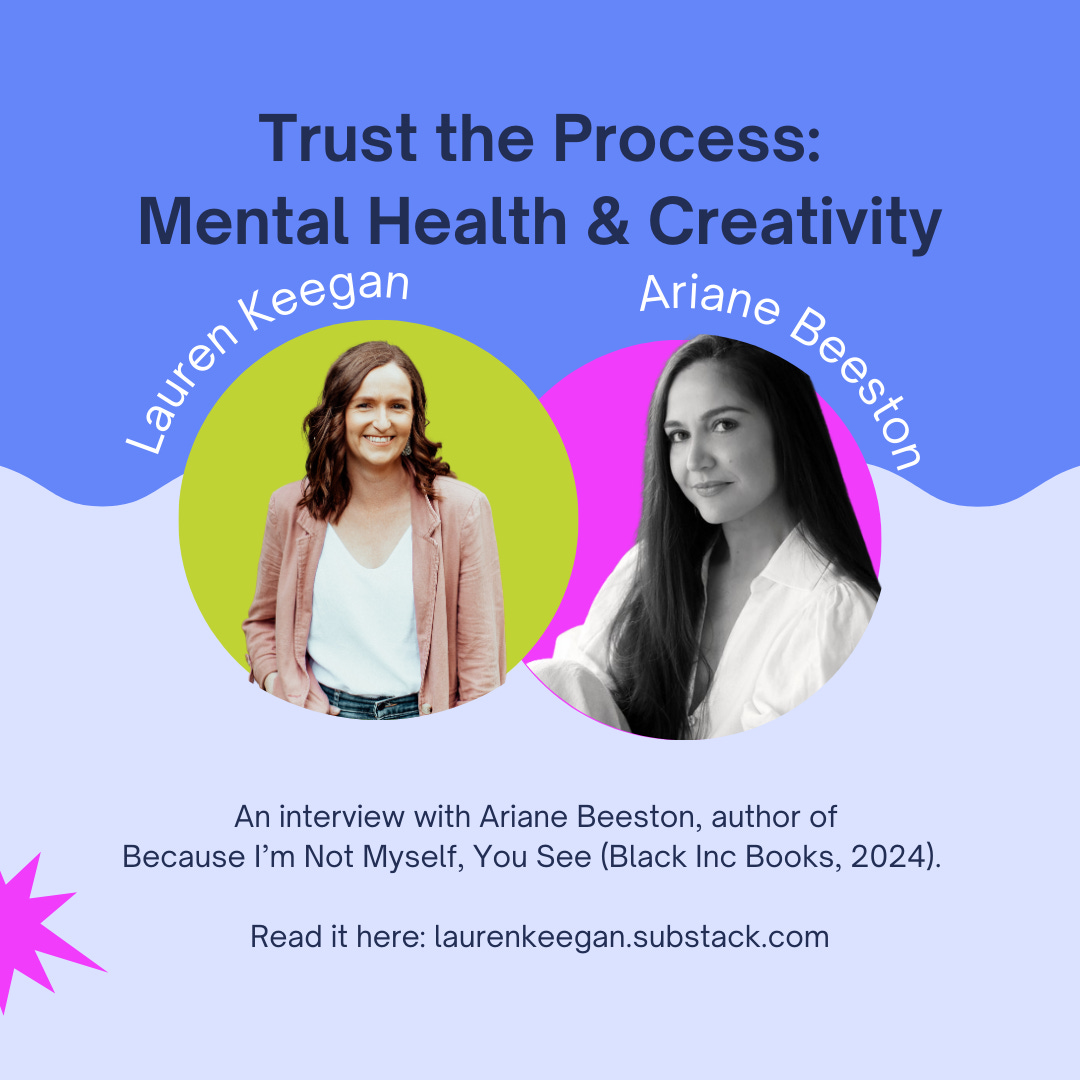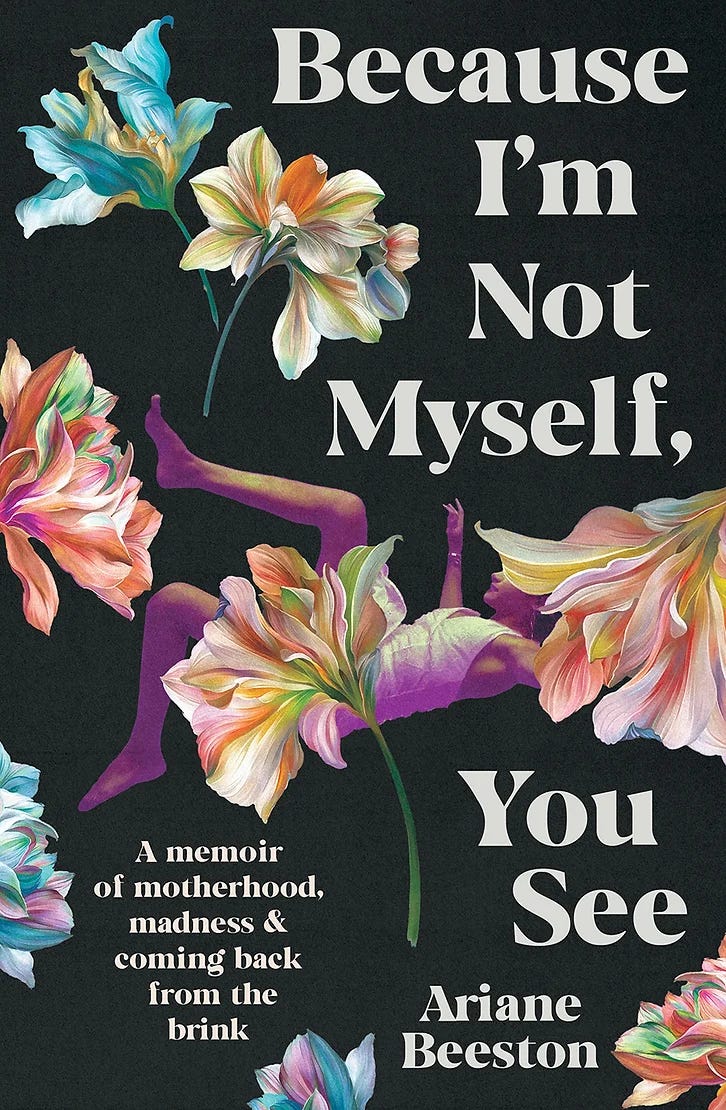Q&A with Ariane Beeston: Author of Because I'm Not Myself, You See.
When the mental health professional becomes the patient. Ariane Beeston's terrifying postpartum experience led to her writing a beautiful memoir that draws upon personal and clinical experience.
Ariane Beeston, welcome to Trust the Process! It’s no secret that I absolutely loved your book. As a mother and a perinatal mental health clinician, I could relate to so much of the inner conflict you share with us on the page.
For people who haven’t read Because I’m Not Myself, You See yet (and they really should!) can you describe your book in 5 words or less?
Raw, funny, insightful, intense, candid
OR A memoir of postpartum psychosis ;)
Prior to the book you worked as a child protection caseworker and a provisional psychologist; roles that require objectivity and factual report writing. Yet, your memoir is so beautifully written; raw and vulnerable. How did you develop your voice as a writer?
Thank you so much! I think I developed my voice as a creative writer first and then had to learn to write objectively and factually for work. I was always writing stories and poems and books as a child. My first novel was about a time travelling ballet dancer called – wait for it – A Step in Time. I was thirteen and from memory I even submitted it to a publisher in the mail and received a lovely and encouraging rejection!
But the wonderful thing about this memoir was being able to bring in both kinds of writing – taking a clinical look at my experience with facts and reason, while also writing that first-person present-tense in the moment point of view that takes readers through my psychotic break postpartum.
What was it about your experience that you felt it needed to be told in a narrative form?
When I was unwell, and in the months and years I spent recovering, I went searching for books about motherhood and madness and couldn’t really find anything. I still remember the moment I realised I needed to write the book myself. I was sitting on the floor of the Mother and Baby psychiatric Unit in a group therapy session and I said aloud, “I’m going to write about this one day. There’s so much I didn’t know about what could happen and what could go wrong. And when I’m better, I’m going to write about it.”
And I did!
Can you tell us about your writing process?
I pitched a proposal and chapter outline as well as a writing sample to publishers so when I got my book deal, I still had to write the book! This meant that I had strict deadlines to work towards, while also working out how to write and structure a memoir. I think because it was so clearly mapped out, the writing itself wasn’t too difficult. I researched and wrote as I went and tackled different chapters in a non-chronological fashion.
I wrote my memoir about perinatal mental health while also working fulltime in perinatal mental health (which I don’t necessarily recommend!) as well as parenting my son. I was logging off from my day job and then logging onto the manuscript for months at a time. In some ways it meant my head was “always in the game” but it also made it difficult to switch off at times.
As I was approaching my deadline for the first draft, I checked myself into a hotel for three nights and wrote and wrote and wrote. Having that first draft done felt like such a huge accomplishment – and such a relief! I knew my publisher had faith that I could do it, but you always wonder – will I be able to write a book? Can I get this done? I got it printed and bound at Officeworks (as you do) and I was just grinning away.
I also wouldn’t have been able to write the book without the support and patience of my husband. Not only was he having to deal with a book being written about his life, but he also really had to step in and take on more when I was in the book cave. He’s wonderful. (Readers love telling me that too.)
I know that being a mental health professional hindered your access (or engagement) to treatment, but did it help/ hinder the writing process?
It was great for writing non-fiction! So many of those skills helped when I was doing the research aspects of the book. I felt completely at home when immersing myself in the literature around perinatal mental health, going back through the history including its inclusion and exclusion from the DSM and the various ways it’s been treated.
The hardest part was working out the right balance of memoir to research knowing that all readers come to books wanting something different and that you can’t necessarily please everyone! I wanted the book to be more than just my story and to really weave in the expert commentary and research too. My little nerd heart was very happy.
What was the hardest part about writing this book?
The most difficult aspect was re-living the most traumatic period of my life. Much of the book is written in the present-tense which meant really going back to that time and remembering how it felt in my body, what I was thinking, what I was seeing, and the impact it had on my family and friends.
Grappling with these memories and working out how to transform them into something coherent and beautiful was hard – but so satisfying.
What was the most rewarding?
I absolutely loved the editing process! I had the most wonderful editors at Black Inc – two women who are also mothers and handled the book (and me!) with such care and kindness.
Having never written a book before, I learnt so much through the back and forth of edits. It felt like a long conversation that continued until the book went to print. I was so proud of that messy but bloated first draft I filed but I also knew how much work it needed to really make it the best book it could be. Watching it take shape, under the guidance of these incredible experts and wonderful women was just such a joy.
What did you have in place to support your mental health while writing your memoir?
Ha! Great question. I continued to see “Dr Q” from the book while writing. She supported me postpartum and again while re-living that time. I also was really careful about not pushing myself too hard and asking for extensions when I needed them. I know as writers we think deadlines are fixed and the idea of missing them is mortifying but I went into the process knowing that I’d ask for what I needed and that I’d listen to my body and mind.
I wrote when I could, rested when I needed – and danced a lot!
What was the weirdest thing you googled while writing/ researching your memoir?
It’s weird and funny but I was wide awake one night thinking through some structural issues when I remembered the story of the woman who looked at different types of tears under the microscope. And I wondered “has anyone looked at postpartum tears? Do they look different to tears of joy, tears of pain, tears shed while cutting onions.”
When I googled, the answers made me wince and cackle: “Slide Show: Vaginal Tears in Childbirth;” “Isolated Rectal Buttonhole Tears in Obstetrics”; “Perineal Tears, A review.”
So… not quite the tears I was looking for!
How did you get your publishing deal?
I pitched a proposal and writing sample to Benython Oldfield an agent at Zeitgeist Writers. He signed me and we worked to refine it before sending it out on submission. There were a few publishers who were interested and the inevitable rejections too! But when I met Sophy Williams from Black Inc we clicked immediately, and I knew my book was in safe hands. I’ve had the most wonderful, thoughtful, hardworking team and couldn’t have asked for better.
What is one thing you hope you book leaves with readers?
Most of us will struggle in some way on the transition to motherhood, which we also call matrescence. While my own experience with postpartum psychosis is rare, other topics that I cover in the book – postnatal depression and anxiety, the immense toll sleep-deprivation can take, body image during pregnancy and after having a baby, breastfeeding difficulties and the changes to your relationship – are far more common, but still often take people by surprise.
I hope readers take some comfort in seeing aspects of their own experience reflected on the page – whether they became a parent last week or decades ago. I also hope it’s the sort of book you might be able to pass to someone and say, “This is what it was like for me! This is what I couldn’t put into words.”
I hope this book shows mothers who may be suffering, or their loved ones, that recovery from severe perinatal mental illness is possible – and that life on the other side can be full of purpose and joy.
How does it feel now to have your book, your story, in the hands of readers?
It’s been a wild and wonderful few months! I was so nervous before the release but the response from readers and critics has been incredible. I’ve received so many beautiful messages from other women who’ve experienced challenges in their transition to motherhood – through pregnancy and birth and postpartum.
I’ve also had so many health professionals, people like yourself working in this space, reach out to tell me how helpful reading a lived-experience account has been for their own practice. Many are also “wounded healers” who perhaps haven’t felt comfortable being open about their own experiences yet – but hope to in the future when they’re ready.
I don’t think the novelty of seeing BINMYS in shops will ever wear off and I still love it when people snap photos of her and send them to me. I also LOVE receiving photos from readers with the book full of highlights or coloured tags in the parts that resonated for them.
I feel so very lucky and so very grateful.
BINMYS is certainly finding it’s place with readers. Now tell us, what’s next?
I’m working on book two which is very different! Watch this space ;)
Ariane, thank you for joining me on Trust the Process.
Readers you can find Because I’m Not Myself, You See at all good book retailers or read the first chapter here. Connect with Ariane on Instagram or her website.
Coming up- Ep 01 Trust the Process LIVE event with Georgia Harper
Next month Trust the Process goes live! Join me and Georgia Harper as we chat psychology, writing and everything in between.
The event is free but you must register at the link below to receive the zoom link.
Book into the live event here.






